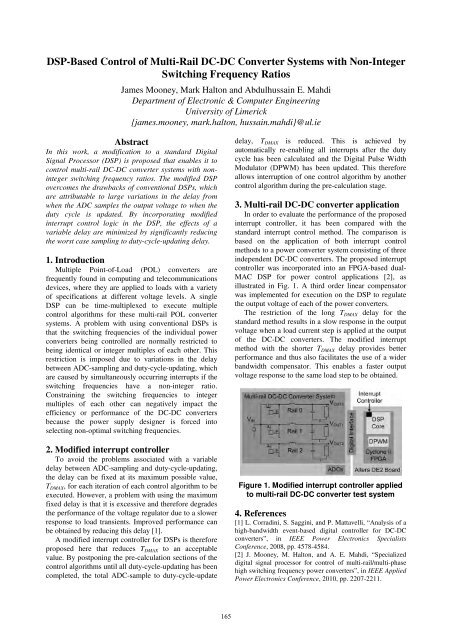NUI Galway – UL Alliance First Annual ENGINEERING AND - ARAN ...
NUI Galway – UL Alliance First Annual ENGINEERING AND - ARAN ...
NUI Galway – UL Alliance First Annual ENGINEERING AND - ARAN ...
You also want an ePaper? Increase the reach of your titles
YUMPU automatically turns print PDFs into web optimized ePapers that Google loves.
DSP-Based Control of Multi-Rail DC-DC Converter Systems with Non-Integer<br />
Switching Frequency Ratios<br />
James Mooney, Mark Halton and Abdulhussain E. Mahdi<br />
Department of Electronic & Computer Engineering<br />
University of Limerick<br />
{james.mooney, mark.halton, hussain.mahdi}@ul.ie<br />
Abstract<br />
In this work, a modification to a standard Digital<br />
Signal Processor (DSP) is proposed that enables it to<br />
control multi-rail DC-DC converter systems with noninteger<br />
switching frequency ratios. The modified DSP<br />
overcomes the drawbacks of conventional DSPs, which<br />
are attributable to large variations in the delay from<br />
when the ADC samples the output voltage to when the<br />
duty cycle is updated. By incorporating modified<br />
interrupt control logic in the DSP, the effects of a<br />
variable delay are minimized by significantly reducing<br />
the worst case sampling to duty-cycle-updating delay.<br />
1. Introduction<br />
Multiple Point-of-Load (POL) converters are<br />
frequently found in computing and telecommunications<br />
devices, where they are applied to loads with a variety<br />
of specifications at different voltage levels. A single<br />
DSP can be time-multiplexed to execute multiple<br />
control algorithms for these multi-rail POL converter<br />
systems. A problem with using conventional DSPs is<br />
that the switching frequencies of the individual power<br />
converters being controlled are normally restricted to<br />
being identical or integer multiples of each other. This<br />
restriction is imposed due to variations in the delay<br />
between ADC-sampling and duty-cycle-updating, which<br />
are caused by simultaneously occurring interrupts if the<br />
switching frequencies have a non-integer ratio.<br />
Constraining the switching frequencies to integer<br />
multiples of each other can negatively impact the<br />
efficiency or performance of the DC-DC converters<br />
because the power supply designer is forced into<br />
selecting non-optimal switching frequencies.<br />
2. Modified interrupt controller<br />
To avoid the problems associated with a variable<br />
delay between ADC-sampling and duty-cycle-updating,<br />
the delay can be fixed at its maximum possible value,<br />
TDMAX, for each iteration of each control algorithm to be<br />
executed. However, a problem with using the maximum<br />
fixed delay is that it is excessive and therefore degrades<br />
the performance of the voltage regulator due to a slower<br />
response to load transients. Improved performance can<br />
be obtained by reducing this delay [1].<br />
A modified interrupt controller for DSPs is therefore<br />
proposed here that reduces TDMAX to an acceptable<br />
value. By postponing the pre-calculation sections of the<br />
control algorithms until all duty-cycle-updating has been<br />
completed, the total ADC-sample to duty-cycle-update<br />
165<br />
delay, TDMAX is reduced. This is achieved by<br />
automatically re-enabling all interrupts after the duty<br />
cycle has been calculated and the Digital Pulse Width<br />
Modulator (DPWM) has been updated. This therefore<br />
allows interruption of one control algorithm by another<br />
control algorithm during the pre-calculation stage.<br />
3. Multi-rail DC-DC converter application<br />
In order to evaluate the performance of the proposed<br />
interrupt controller, it has been compared with the<br />
standard interrupt control method. The comparison is<br />
based on the application of both interrupt control<br />
methods to a power converter system consisting of three<br />
independent DC-DC converters. The proposed interrupt<br />
controller was incorporated into an FPGA-based dual-<br />
MAC DSP for power control applications [2], as<br />
illustrated in Fig. 1. A third order linear compensator<br />
was implemented for execution on the DSP to regulate<br />
the output voltage of each of the power converters.<br />
The restriction of the long TDMAX delay for the<br />
standard method results in a slow response in the output<br />
voltage when a load current step is applied at the output<br />
of the DC-DC converters. The modified interrupt<br />
method with the shorter TDMAX delay provides better<br />
performance and thus also facilitates the use of a wider<br />
bandwidth compensator. This enables a faster output<br />
voltage response to the same load step to be obtained.<br />
Figure 1. Modified interrupt controller applied<br />
to multi-rail DC-DC converter test system<br />
4. References<br />
[1] L. Corradini, S. Saggini, and P. Mattavelli, “Analysis of a<br />
high-bandwidth event-based digital controller for DC-DC<br />
converters”, in IEEE Power Electronics Specialists<br />
Conference, 2008, pp. 4578-4584.<br />
[2] J. Mooney, M. Halton, and A. E. Mahdi, “Specialized<br />
digital signal processor for control of multi-rail/multi-phase<br />
high switching frequency power converters”, in IEEE Applied<br />
Power Electronics Conference, 2010, pp. 2207-2211.
















